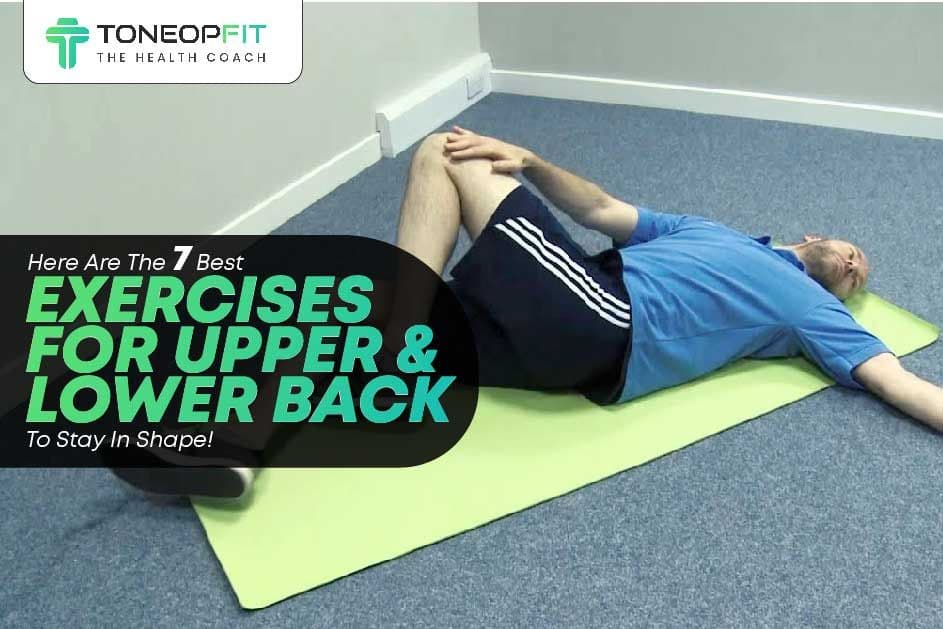With the growing popularity of fitness influencers on various social media platforms, people are tuning into different workouts to build their upper and lower back. From strengthening your upper arms to toning your abs, we do everything possible to stay in shape. However, health and fitness professionals assert that strengthening our back muscles is equally crucial when engaging in weight training and other types of physical activity! A strong back not only creates a lasting impression but also boosts confidence!
Your back muscles are involved in everything from lifting large weights to supporting the ultrastructure of your body. So, if you are also looking to work on your back muscles, want to improve your athletic ability or are looking for effective exercises to reduce back pain. Preventing injuries and preserving general fitness require strengthening and extending the flexibility of the upper and lower back muscles.
Focused exercises improve posture and ease the pain of extended sitting or physical activity. People can develop a balanced and resilient back by using various exercises targeting several muscle groups, including the erector spinae, latissimus dorsi, and rhomboids. Read along to learn about the best 7 exercises for upper and lower back, ways to pick your fixed upper and lower back pain and which exercises work the upper and lower back.
Table Of Contents
1. 7 Exercises For Upper And Lower Back
2. What Exercises Work On Upper And Lower Back?
3. How Do You Fix Upper And Lower Back Pain?
4. Expert’s Advice
5. FAQs
6. References
7 Exercises For Upper And Lower Back
7 best exercises for the upper and lower back are:
Exercise | Instructions | Target Muscles |
| Lumbar rotation |
| Internal and External Obliques, Erector Spinae, Psoas Major, Quadratus Lumborum, Rotators |
| Quad Superman |
| Erector Spinae, Rectus Abdominus, Gluteus Maximus, Latissimus Dorsi. |
| Plank with Leg Lift |
| Erector Spinae, rectus abdominis, oblique abdominis, transversus abdominis, gluteus maximus. |
| Alternating Superman Flutter |
| Erector Spinae, Gluteus Maximus, Hamstrings, Latissimus Dorsi |
| Side plank hold |
| Internal and external oblique muscles, Serratus Anterior, Deltoid, Gluteus Medius |
| Glute Bridge |
| Gluteus Maximus, Gluteus Medius, Gluteus Minimus, hamstrings, transversus abdominis. |
| Deadbug |
| Transversus abdominis, rectus abdominis, internal and external obliques, pelvic floor muscles |
Also Read: Try 7 Targeted Middle-Back Workout Exercises At Home With Training Tips!
What Exercises Work On Upper And Lower Back?
To work on the upper and lower back, the following exercises are good:

1. Knee To Chest Stretch
How to do it?
- Lie down facing the sky with your knees bent and feet flat on the floor.
- With both hands, lift one knee and press it to your chest.
- Pull your spine to the floor and tighten your abdominal muscles.
- Tent for a duration of five seconds.
- Repeat with the other leg, going back to the beginning position.
- Then, simultaneously repeat with both legs. Every stretch should be done two or three times. Do the entire routine once in the morning and once in the evening.
2. Rotational Stretching Of The Lower Back
How to do it?
- With your feet flat on the ground and your knees bent, lie on your back.
- Rotate your bowed knees carefully to one side while maintaining a firm grip on the floor with your shoulders.
- Slowly return to the starting position.
- Repeat on the other side.
- Repeat each stretch 2 to 3 times.
- Do the entire routine once in the morning and once in the evening.
3. Lower Back Flexibility Exercises
How to do it?
- With your feet flat on the ground and your knees bent, lie on your back.
- Pull your lower back from the floor by contracting your abdominal muscles.
- Hold for five seconds, and then relax.
- Straighten your back and pull your navel toward the floor. Hold for five seconds, and then relax.
- Repeat. Start with five repetitions daily and slowly work your way up to 30.
Also Read: 6 Proven Exercises And Tips for Increasing Flexibility!
4. Bridge Exercise
How to do it?
- With your feet flat on the ground and your knees bent, lie on your back.
- Tighten your gluteal and abdominal muscles while maintaining a calm head and relaxed shoulders on the floor.
- Then, lift your hips off the ground so that your shoulders and knees are parallel.
- Try to stay long enough to take three deep breaths.
- Return to where you started and repeat.
- Start with five repetitions daily and slowly work your way up to 30.
5. Cat Stretch
How to do it?
- Get down on your knees and hands.
- Slowly arch your back as if pulling your belly toward the ceiling as you lower your head.
- Then, slowly let your back and stomach drop towards the floor and lift your head. Go back to where you started.
- Repeat 3 to 5 times twice a day.
How Do You Fix Upper And Lower Back Pain?
By practising proper body mechanics and improving your physical condition, you can correct back pain and prevent it from recurring. You can keep your back healthy and strong by doing the following:
1. Increase Muscle Strength And Flexibility
You can start with abdominal exercises for your upper and lower back to strengthen your core and help condition the muscles to work together to improve your back. A professional can tell you what exercises may work for you.
2. Posture
Posture is essential for maintaining proper posture. Avoid slouching and focus on proper posture when sitting or standing. Do not bend your body unnecessarily. Follow these tips to improve your posture:
- Make sure your workspaces are at an appropriate height.
- Adjust your seat so that it is comfortable while working.
- Sit upright and straight.
- Move and stretch your muscles regularly.
- When sitting, place a pillow behind your lower back to improve support.
Most back pain is mechanical in origin, meaning repetitive stress on the back, such as awkward or static positions, prolonged sitting, bending over, standing and carrying heavy loads, can lead to lower back sprains.
3. Stretching
The most important thing is to nourish and stretch the lower back. To avoid stiffness, try stretching your neck and shoulders every few hours. They are great for releasing tension.
- To get rid of pain and pressure, you can try neck stretches. Stretching increases the neck's flexion range of motion and helps support the back.
- Gently press your chin to your chest. Repeat this several times a day for optimal results.
- Neck retraction reduces pressure on the spine. Place your fingers on your chin and push it far back. Do 3-4 sessions during the day.
4. Exercise Regularly
Regular exercises for upper and lower back strengthen the back. Doing this consistently enables weight loss. You can also manage your stress level with regular exercise. Make sure your exercise routine includes stretching, balancing and back strengthening.
5. Avoid Unhealthy Habits
It may not seem like unhealthy habits are affecting your back, but they aren't. As mentioned above, smoking increases back pain. The same goes for drinking alcohol. Smoking reduces blood flow to bones and soft tissues, causing severe back pain.
Drinking too much alcohol increases the level of inflammation, which also increases pain. Limiting or at least mitigating these habits will go a long way in preventing many ailments, including back pain.
6. Watch Your Weight
Staying fit is essential to reducing back pain. Being overweight puts stress on the spine's muscles. For this reason, practising a healthy diet and exercise can help relieve back stress in the long run.
7. Massage
Deep massage relaxes muscles, promotes blood circulation and releases endorphins. Regular massage can help speed recovery from chronic back pain.
8. Avoid Stress
When you're stressed, your muscles can tighten and contract. To avoid stress, relax, take deep breaths, and try singing.
9. Do Not Slouch While Working
Sit up straight in your office chair. Make sure to sit and stand with proper alignment. If you frequently sit for longer periods when it comes to a desk job, maintaining good posture is crucial to keeping your back healthy. Choose a chair with firm support or take pillows for additional support for your lower back. Correct posture will ensure that your back does not hurt.
10. Correct Sleeping Methods
Sleep at least 6-7 hours daily to maintain good back health. Sleeping well in a comfortable position reduces back pain and stiffness. Please use an orthopaedic mattress, as it provides much-needed back support.
11. Drive Comfortably
Wear a support pillow when driving. Use light bags when travelling so you don't have to strain your back while carrying them. If you are travelling to a remote destination, take breaks in between. And remember to stretch occasionally.
Also Read: Top 5 Exercises For Upper Abs & Tips To Strengthen | ToneOpFit
Expert’s Advice
Whether you suffer from back pain or not, avoid movements that can strain or twist your back. Lower back strengthening and stretching exercises can work together to improve lower back strength, stability, and flexibility. In doing so, they can help relieve and prevent back pain. If any of the above back exercises worsen your back pain, it is vital to stop them immediately and contact your doctor.
Health Expert
Lavina Chauhan
The Final Say
One of the best ways to lead a healthy life is to have a healthy body. As they say, a healthy mind lives in a healthy body. So, if you want to work on your mental health this year, you must approach it with the proper exercises for upper and lower back. Research says that when we have a more muscular back, it automatically signals our brain to feel more confident! A more robust and sexier back will ensure a healthy figure, support our mental health, and boost our self-confidence!
FAQs
1. Suggest 5 best exercises for the upper and lower back which can be done daily
The 5 best exercises for the upper and lower back are:
- Quad Superman
- Plank with Leg Lift
- Alternating Superman Flutter
- Side plank hold
- Glute Bridges
2. What are the 3 upper and lower back strengthening exercises?
The 3 best upper and lower back strengthening exercises are:
- Bent-over row
- Bird-dog exercise
- Reverse fly
3. What are the benefits of upper back and lower back exercises?
Numerous upper-back workouts also help to maintain and enhance shoulder health. This is because a number of upper-back muscles, most notably the rotator cuff, rhomboids, and lower traps, collaborate to stabilise the humerus or upper arm bone.
4. Is it okay to do exercise for upper and lower back muscles daily?
It is not recommended to train your back muscles every day, as these large muscles require days of rest to allow the muscle tissue to regenerate and grow. It is best to exercise your back 1-2 times a week.
References
- https://www.nhsinform.scot/illnesses-and-conditions/muscle-bone-and-joints/exercises/exercises-for-back-pain/
- https://athleanx.com/articles/back-for-men/back-workouts
- https://www.medicalnewstoday.com/articles/323204#summary
- https://www.mayoclinic.org/healthy-lifestyle/adult-health/in-depth/back-pain/art-20546859
About ToneOp Fit
ToneOp Fit is a platform dedicated to improving and maintaining good health through a comprehensive range of goal-oriented health plans with up to 3 Coach support. With a range of Weight Management, Medical Condition, Detox Plans, and Face Yoga Plans, the app also provides premium health trackers, recipes and health content. Get customised diet, fitness, naturopathy & yoga plans and transform yourself with ToneOp.










































